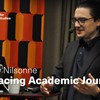venue
Gustav Nilsonne: Pathways to an open science system: Replacing academic journals
Venue: Institutet för framtidsstudier, Holländargatan 13, 4th floor, Stockholm, and onlineREGISTERResearch seminar with Gustav Nilsonne, Associate Professor of neuroscience. He is active in meta-sciencOpen science enables cumulative knowledge and facilitates discovery. The transition to an open science system is underway, but important roadblocks remain. A decentralised, evolvable network of platforms interconnected by open standards, and governed by the scientific community, is technically feasible. However, academic researchers remain tied to traditional journals not least because assessment of merit is tied to the venue of publication. Ways forward can include redirection of funding from legacy publishing models to new infrastructure and the development of new methods to assess scientific contributions. Concerted action by stakeholders needs to be combined with pluralistic experimentation on policies and interventions to further open science practices.
Climate change, risk and population ethics - Tore Browaldh-föreläsningen 2016
Gustaf Arrhenius will give the Tore Browaldh-lecture this year in Gothenburg. One of the most important insights to emerge over the past hundred years is that the actions of the current generation – th

Gustav Nilsonne: Pathways to an Open Science System. Replacing Academic Journals
Open science enables cumulative knowledge and facilitates discovery. The transition to an open science system is underway, but important roadblocks remain. A decentralised, evolvable network of platfo
Workshop on social and political philosophy of language
Venue: Campus Albano, Lärosal 11 (before lunch) and Lärosal 10 (after lunch) Anyone who is interested in the intersection between social and political philosophy and philosophy of language is welcome to (You are welcome to attend even if you do not indicate it on the doodle beforehand, but doing so is appreciated for planning purposes).
Research seminar with Sarah Birch: Voting for the future
Venue: Institutet för framtidsstudier, Holländargatan 13 in Stockholm, and online Research seminar with Sarah Birch, Professor of Political Science atKing's College London. You can join in person or onlin
Ottmar Edenhofer: Climate, War and Science. Practical Dilemmas, Theoretical Challenges and a New Era of Climate Policy
Venue: Institutet för framtidsstudier, Holländargatan 13 , 4th floor in Stockholm, and online REGISTER >Research seminar with Ottmar Edenhofer, who is Director and Chief Economist of the Potsdam InstAbstractStarting by stating the current status quo of climate change, the talk focuses on the practical dilemmas an ambitious climate policy is facing, also on the grounds of the theoretical challenges involved. The present geopolitical global situation is calling for a new era of climate policy. But how do we get there?
Research seminar with Michael Rosen: The Shadow of God and the Passage from Heaven to History
Venue: Institutet för framtidsstudier, Holländargatan 13 in Stockholm, and onlineResearch seminar with Michael Rosen, professor of political theory, Government Department, Harvard UniversityYou can jo
Martin O'Neill: Limiting Markets: Socialisation, Decommodification, and the Sense of Justice
Venue: Institutet för framtidsstudier, Holländargatan 13, 4th floor, Stockholm, or online.Research seminar with Martin O'Neill, Professor of Political Philosophy, University of York.Register here AbstraMy talk addresses the questions of the size of the public sector in a just society, and the range of goods and services which should be decommodified, and provided to citizens outside of market relationships, in such a society. I examine some of the different answers given to these questions by (a) liberal egalitarians (particularly Rawls) and (b) social democrats and democratic socialists (particularly Esping-Andersen). Then, making use of the work of theorists including Waheed Hussain and Ralph Miliband, I examine the plausibility of a 'left Rawlsian' position, which would marry socialist insights about the functions of public provision with a liberal egalitarian account of the principles of justice, in order to defend an institutional model of a just society which would embody a form of liberal democratic socialism."
Bo Rothstein: The Shadow of the Swedish Right
Venue: Institute for Futures Studies, Holländargatan 13, Stockholm, or online. RegisterResearch seminar with Bo Rothstein, Professor of Political Science, University of Gothenburg Abstract In the recent
Mike Otsuka: Determinism and the value and fairness of lotteries
Venue: Institute for Futures Studies, Holländargatan 13 in Stockholm, and online Note that the speaker will join us online. Research seminar with Mike Otsuka, Professor of Philosophy at Rutgers Universit








